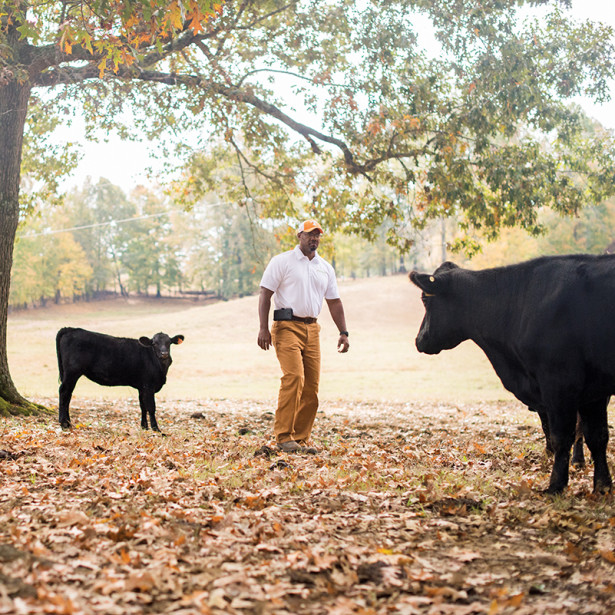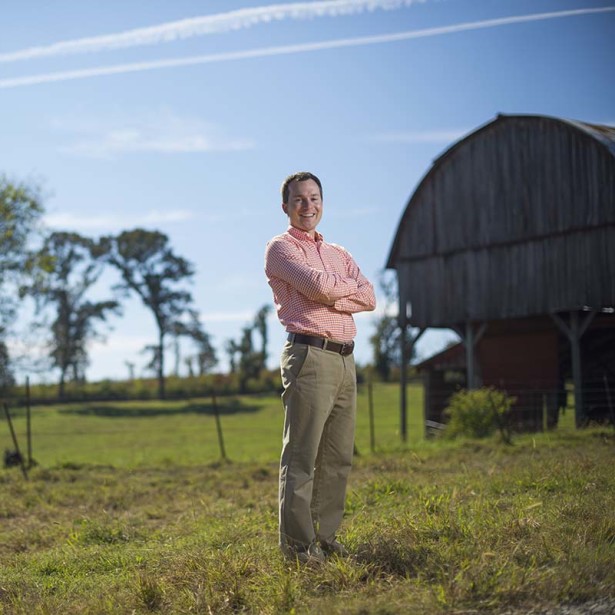By Fred Brown
Photography and video by Adam Brimer
Extension emphasizes helping people improve their livelihoods where they live. Follow any road in Tennessee, and you’ll find people whose lives have been impacted by UT Extension.
Agriculture, the physical act of farming, has played a central role throughout Tennessee’s 220-year history. And, through its extensive outreach, the University of Tennessee, which pre-dates establishment of the state by two years, has a history of partnering with Tennesseans and impacting quality of life at every level.
That support was formalized in 1910 with the creation of UT Extension. Since then, helping farmers derive as much production as possible—from lands on the Mississippi near Memphis to the hillsides of East Tennessee—has become one part of UT Extension’s much larger story.
“In 2013, agricultural revenues totaled $4.12 billion, and the agro-forestry industrial complex contributed $74.8 billion to the Tennessee economy, accounting for 12.8 percent of the economic activity conducted within the state, and employed an estimated 349,398 individuals, or 9.4 percent of the total number of workers,” says UT Extension Dean Tim Cross.
“In this study, the agro-forestry industrial complex included the primary industries typically associated with agriculture and forest operations such as growing crops, breeding and feeding livestock, and the management and logging of trees.”
Also included were food and beverage manufacturing, apparel and textiles, and forestry products manufacturing.
These kinds of impacts cannot happen without a dedicated force of UT Extension agents (a name carried over from Extension’s earliest days), Cross says.
“Our Extension agents have a long history of providing education to farmers and to families and youth statewide, helping Tennessee grow and progress over generations.”
100 Years and Growing
UT Extension turned 100 in 2010, and UT President Joe DiPietro says it’s as important today as ever.
“UT Extension is the university’s direct link to Tennesseans in fulfilling our land-grant mission,” he notes, adding that UT Extension is the front door to UT statewide.
UT Extension and its 4-H Youth Development program have served Tennesseans “when times were good and when they were not,” he says.
“Their work during two world wars, a pandemic and in forming boys’ corn clubs and girls’ canning clubs to preserve food for winter months is only a slice of their mission and accomplishments in their first 100 years to serve and solve local needs,” says DiPietro.
Today, UT Extension’s network of 300 agents is as diverse as the farmers, families and young people they serve. Cross says agents are supported and provided educational materials and curriculum by 75 specialists on campuses and in AgResearch Research and Education Centers across the state. Researchers develop new information and technologies agents use to help farmers and their families. Specialists translate research results into language readily understood and applied by the public.
The agents’ job, Cross says, is to use information provided by researchers and extension specialists to apply education and research-based solutions to real-world problems.
In 2013, agricultural revenues totaled $4.12 billion, and the agro-forestry industrial complex contributed $74.8 billion to the Tennessee economy.
As compelling as the combined UT Extension and agriculture architecture is, it’s even more impressive when added to the 180,000-plus 4-H club members statewide overseen by UT Extension and the 2 million contacts staff make annually with Tennessee families. Extension agents often are the gateway students and their families have to UT’s educational opportunities.
Agents work in all 95 counties to bring the latest technology and best advice to a wide range of concerns, from complex questions about farm management and conservation to balancing family finances, animal husbandry, implementing large-scale row crop production, preparing nutritious meals for the family and teaching young people valuable life skills. UT is one of the nation’s oldest public universities and among early land-grant institutions created under the Morrill Act passed by Congress on July 2, 1862.
It donated public lands to states and territories for providing colleges with resources to enhance agriculture and mechanical arts. As the first federal aid to higher education, the Morrill Act made it possible for western states—of which Tennessee was a part at the time—to establish colleges. The result was vast opportunities for farmers and others previously excluded from higher education by its relatively high cost at that time.

Knoxville ’03, ‘11
Since UT President Brown Ayres pushed formation of the Extension service in 1910 “to reach thousands of farmers where now we only reach hundreds,” UT Extension has been a key player in guiding Tennessee’s farmers into an economic powerhouse.
Recent economic analysis shows that, for every dollar invested in agriculture, almost $10 returns to the economy.
The Faces of UT Extension
Johnny Barnes, a Wilson County Extension agent in Lebanon is one of those who helps farmers maximize production and income, but that’s not all he does.
Barnes (Knoxville ’03, ’11) has been a 4-H Extension agent in Wilson County for more than 10 years, and his passion is promoting traditional agricultural programming for young people through 4-H activities and events. Day to day, his job ranges from working with 4-H programs to meeting with school clubs and training judging teams. He says he enjoys seeing students get excited about 4-H training and leadership opportunities.
“We have a very successful program and have a lot of first places in leadership and citizenship programs,” he says.
Wilson County 4-H youth participants are involved in projects from livestock production to shooting sports and public speaking. Barnes has used hunting and archery as a vehicle to teach life skills, responsibility, safety and work ethic. In fact, he started Tennessee 4-H’s first archery program as a way to interest students in 4-H. Since many already were interested in hunting sports, archery was appealing—and soon popular.
Of more than 200 4-H’ers to whom Barnes has taught outdoor skills, well more than half were archery participants, which eventually led to a 4-H archery team. Barnes says his archery teams have competed in national 4-H meets and placed in the top 10.

Heather Kyle-Harmon (Knoxville ’96, ’04), an agent who grew up in Knoxville and graduated from Central High School, has been with UT Extension for 18 years and with the Knox County office about four years.
She works in family consumer sciences—formerly home economics, she says. “I do everything surrounding the home.”
That includes food nutrition and food safety, even food canning and home food-preparation classes.
Other programs under her wing include child care, court-ordered parenting classes for divorced couples, personal finance management and environmental health, and making homes more energy efficient.
She also is a frequent presenter at events and activities around Knoxville, including giving food demonstrations at the New Harvest Park Farmers Market in East Knoxville.
“What keeps you going is that you really do help people. You see a difference you are making in people’s lives.”
Extension is a statewide educational organization funded by federal, state and local governments that brings research-based information about agriculture, family and consumer sciences, and resource development to the people of Tennessee.
JC (yes, that’s really his first name) Dupree Jr., is a Lauderdale County agent who says he gets to play in the dirt. He knows just about everybody in the county, and they know him. Dupree grew up on a 300-acre farm in Huntingdon, attended Jackson State Community College and earned a degree in soil sciences at Tennessee State University in Nashville. UT hired him in 1991.
As extension director and agricultural agent for the county bordered by the Mississippi River, Dupree handles crop questions from cotton to sorghum.
He also offers the UT Master Beef Producer program, training for beef cattle farmers presented in 12 sessions of three hours. Content deals with feeding, marketing, genetics, care, food safety and just about anything else a farmer needs to know about beef cattle. Dupree says the county’s largest crop, at 87,000 acres, is soybeans, but the biggest cash crop is beef.
Coming from a small farm to the mega-spreads in Lauderdale County was a shock, Dupree says, and the equipment used on today’s farms is “just awesome.”
“Some of it is as large as a tank,” Dupree says. “It’s loaded with computer equipment, some of which tells you the amount of moisture in the grain from a given part of the field as you harvest.”

Some farmers routinely operate soybean combines that cut 30-footswaths in the field. Corn combines can sweep up 18 rows of corn at a time. Farming has evolved from primarily manual labor to a business in which advanced degrees in technology and agricultural sciences aren’t uncommon, DuPree says, “You have to have that to operate some of this equipment.”
Though he no longer farms as his day job, Dupree says, “Working for UT Extension is the next best thing” because he can still go out and play in the dirt.
A Lifelong Relationship With UT, Initiated by 4-H
Ben Sanders, executive director of government affairs for Tennessee Farm Bureau Insurance in Columbia, grew up on a dairy farm in Charleston, Tenn.
Sanders (Knoxville ’03, ‘05) is also president of the UT 4-H Alumni Association and is on the UT 4-H Foundation Board of Directors.
In his work, Sanders spends much of his time lobbying in legislative halls for Farm Bureau, fighting to keep insurance rates in line. “The sum of (his job),” Sanders says, “is ensuring that legislation does not increase the cost of insurance for our Farm Bureau members.”
Most new insurance legislation has good intentions but can cause unintentional increases in premiums, he says.
“My job is to educate lawmakers on the cost and impact of legislation. I also coordinate political activities for our agents across the state to help them build relationships with their lawmakers,” Sanders says.
His 4-H involvement began as an elementary school 4th-grader, continued through his education at UT, and he supports both today. He credits 4-H and UT with his communication, problem-solving and farm management skills, and experience he brings to Farm Bureau.
“Today, when I read a resume and see someone with 4-H background, I know they understand service to others, they’ve done public speaking, have good communication skills, and the idea of being in front of a group is old hat,” Sanders says.

Knoxville ’03, ‘05
Veterans of 4-H also have critical-thinking skills and good judgment, making them ideal candidates for a job, he adds.
As president of UT 4-H Alumni, Sanders leads an organization of more than 2 million Tennesseans. More than 180,000 come through the 4-H program yearly.
“Our job is to support the program and ensure current 4-H’ers have the same opportunities and education we did,” Sanders says.
For many schoolchildren, Sanders says, 4-H is a lifeline to becoming productive citizens.
“There is no way to track how much support they get and how many students come to UT because of 4-H,” he says, “but I know I wouldn’t have gone to UT if not for 4-H. The outreach is amazing.”
Extension is a gateway to the University as the outreach unit of the UT Institute of Agriculture.
Elizabeth Sanders (no relation) is another of many Tennesseans whose long relationship with UT began in 4-H. Sanders (Martin ’15) is a graduate student at UT Martin, pursuing a master’s degree in family and consumer sciences. Upon completing her bachelor’s, Sanders spent the summer working for the National 4-H Council as a program assistant for the Citizenship Washington Focus program. As an undergraduate, she was a student intern with Gibson County Extension Service.
Sanders grew up on a small sheep and goat farm in Middle Tennessee in DeKalb County. Because her mother had been involved in 4-H, Elizabeth also became interested, spending time in school and summers at 4-H events.
In fact, as a participant when UT Martin hosted 4-H Roundup, an annual summer conference for high schoolers, Sanders decided UT Martin would be her college home. An unabashed tool of UT Extension to keep Tennessee’s best and brightest at home, 4-H Roundup declares its first objective is to better acquaint participants “with their state university and career opportunities offered by the University of Tennessee.”

Martin ‘15
“Growing up in 4-H offers life choices,” Sanders says. “You learn to work hard and reach for goals. I began to understand I could do more than I thought I could and go further than I had imagined. 4-H showed me a better version of myself.”
Through 4-H leadership programs, Sanders says she soon discovered something else: “I can take on any job I put my mind to, and I can do anything I put my mind to.”



